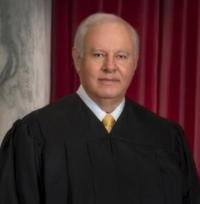
Michael Sparks
CHARLESTON – The state Supreme Court has refused to reinstate the law license of a former Mingo County prosecuting attorney.
In a 3-2 decision issued May 22, the Justices denied reinstatement for C. Michael Sparks, who was disbarred in 2013 after pleading guilty to a misdemeanor related to a political scandal. He resigned as prosecutor as part of a plea deal.
The majority of the court said Sparks “failed to meet his requisite burden to warrant reinstatement at this time.”
The Office of Disciplinary Counsel previously opposed Sparks’ reinstatement before the Hearing Panel Subcommittee, but it then consented to the HPS recommendation of reinstatement.
Justices Beth Walker and Charles Trump dissented and filed a separate opinion. Circuit Judge Jacob Reger heard the case in place of Justice Haley Bunn, who disqualified herself.
Sparks was first elected as Mingo County Prosecuting Attorney in 2004. He was re-elected in 2008 and 2012 before resigning in 2013 as part of a federal plea deal for his role in a political and judicial corruption scandal involving former Mingo Circuit Judge Michael Thornsbury.

Wooton
Sparks pled guilty to aiding and abetting deprivation of a constitutional right under color of law, a misdemeanor, for his role in a scheme to entice a criminal defendant to discharge his counsel, who was believed to be providing the press and FBI with information damaging to then-Mingo County Sheriff Eugene Crum. Sparks spent one year in prison.
After the April 2013 murder of Crum, Sparks began cooperating with the FBI and viewed himself as a “collaborator” in the federal investigation. The scandal was publicly brought to light with an August 2013 indictment against Thornsbury alleging crimes of corruption stemming from his vendetta against the husband of his assistant, with whom he was allegedly having an extramarital.
Although he was not charged in the Thornsbury indictment, Sparks was named and implicated. Sparks was charged in an October 2013 information and pled guilty to a crime involving George White, who was owed about $3,000 by Crum for political signs. When White sought payment, Crum allegedly sent an informant to conduct a controlled drug buy from White, resulting in the filing of five criminal charges against White in February 2013.
In March 2013, Crum told Sparks he was told White and his attorney were talking to the press and possibly the FBI claiming Crum also purchased drugs from White.
Sparks and another associate and ally of Crum allegedly planned to coerce White into firing attorney Charles “Butch” West, who ran against Sparks in the 2012 election, by offering a “more favorable plea agreement.” Sparks agreed to allow White to plead guilty to two of the five charges, surrender a lesser monetary forfeiture. Sparks then would recommend concurrent, rather than consecutive, sentences and/or probation.
In his petition for reinstatement, Sparks says he “simply failed to intervene in the scheme to deprive White of his counsel.” He also said he offered White “no better plea deal than he would have any other defendant,” which the Supreme Court says was “in stark contrast to the factual predicate upon which the district court accepted his guilty plea.”
When questioned by ODC about why he agreed to and pled guilty based on the facts contained in the stipulation, Sparks said his attorney initially “accepted (the plea deal) without knowing what I was going to plead to, but Sparks said he was unwilling to “roll the dice” against threats of stiffer charges.
When asked about contradictions in his testimony and his guilty plea, the court says Sparks “attempted to walk back his inconsistency.” And the ODC originally proposed Sparks should not be reinstated, claiming his “repackaging of his role in the crime was a poor reflection on his character and integrity, deeming his equivocation ‘striking and troublesome.’”
But after the HPS recommended reinstatement, the ODC filed its consent to reinstatement.
The court says the HPS claimed Sparks’ “statements and testimony have remained consistent” and “heavily emphasized” his early cooperation with the federal government, which was characterized as “substantial” and critical to its success in obtaining the convictions stemming from its investigation.
The HPS noted that petitioner cooperated without demands for immunity and further emphasized his “unwavering acceptance of responsibility” as well as the absence of any benefit to him to participate in the crime.
“It (the HPS) found that his integrity and moral character was shown through his assistance to the government and commented heavily on his demonstrated remorse,” the majority opinion, written by Chief Justice Bill Wooton, states. “After publication of his reinstatement petition, ODC received no letters in opposition to his reinstatement.
“Both petitioner and his character witness claimed that if returned to the practice of law in his community, petitioner would be warmly welcomed as many in the community believe he was ‘done wrong.’”
The majority opinion says there “is simply no question (Sparks’) testimony for purposes of reinstatement differs in every material way from the facts to which he agreed for purposes of securing a simple misdemeanor conviction.”
“Despite offering expected expressions of remorse and acceptance of responsibility, petitioner’s reinstatement testimony is clearly designed to significantly downplay his involvement in the corruption in Mingo County,” the opinion states. “If petitioner made admissions that were not true for purposes of leniency from the government or sentencing court, he bears the consequences of those admissions before this court.”
The court says Sparks’ misconduct while in a public office “leveraged the power and trust placed in him by the electorate to affect the constitutional rights of a private citizen, all for the protection of fellow corrupt public officials.”
“With the certainty and gravity of petitioner’s misconduct in little doubt, we find that the position he has taken in the instant proceedings reflects poorly on his current rehabilitation, fitness and integrity,” the opinion states. “We have held that rehabilitation is ‘demonstrated by a course of conduct that enables the court to conclude there is little likelihood that after such rehabilitation is completed and the applicant is readmitted to the practice of law he will engage in unprofessional conduct.’
“Rehabilitation, by its nature, requires an attorney’s acknowledgement of his wrongdoing and we have therefore tied the rehabilitation analysis to the generalized integrity and fitness requirements for reinstatement. …
“Although ODC has silently retreated from its opposition to petitioner’s reinstatement, it has previously opposed reinstatement where a lawyer’s testimony is inconsistent regarding the underlying misconduct, as reflecting a lack of sufficient rehabilitation. …
“But rehabilitation sufficient to warrant reinstatement is not demonstrated solely by falling on one’s sword and thereafter avoiding personal or professional missteps —that is the bare minimum expected from a disbarred attorney before seeking reinstatement.
“Accountability must be more than superficial; it must be thorough and consistently reflected in a lawyer’s words and actions.”
The majority says it can’t ignore Sparks’ “unjustifiable position” that although he admitted, under oath, to facts for the purpose of avoiding more serious criminal exposure, he should now be permitted to minimize his “actual” involvement and be granted the favor of leniency as a result.
“And while we do not presume to wholly dismiss petitioner’s stated regret, this posturing makes his acceptance of responsibility appear more expedient than sincere. … When asked why he consented to disbarment, petitioner testified that he did so because he had ‘pled guilty to a federal offense, and ... I disgraced my profession, and just that’s — I thought that’s what I needed to do.
“Much to the contrary, petitioner’s consent to disbarment was a specific term of the plea agreement into which he entered with the government, rather than a voluntary gesture of penitence.”
It notes Sparks has “offered two contradictory accounts of his misconduct — both under oath.”
“His current willingness to demean the oaths he took prior to each piece of testimony provides little reassurance that he now possesses the inviolate respect for the legal system which he previously lacked,” the majority opinion states. “Moreover, petitioner’s attempt to mitigate his conduct by characterizing it as a mere ‘failure to intervene’ is cold comfort to the victims of Mingo County corruption.
“We are mindful of the message that would be sent not only to the citizens of Mingo County, but the state and bar at large, were this court to so easily permit petitioner to recast his role in a period of Mingo County politics that remains a stain on the county and state.
“We therefore reject the fundamental premise underlying the HPS’s recommendation of reinstatement: that petitioner has demonstrated ‘unwavering’ remorse and maintained consistency regarding his role in the underlying misconduct.”
The majority says the HPS’s attempt to “rationalize the blatant discrepancies” in Sparks’ testimony are “neither reasonable, persuasive nor warranted.”
“Petitioner’s self-serving attempt to distance himself from his own sworn admissions militates against a finding of sufficient rehabilitation; the rationale expressed by the HPS fails to persuade us otherwise,” the majority opinion states. “In recommending reinstatement the HPS placed substantial emphasis on petitioner’s cooperation with the federal investigation.
“However, petitioner himself admitted he viewed himself as a ‘collaborator’ with the government at the outset of the investigation — well before he perceived himself to be a target — and therefore his cooperation cannot be viewed primarily as an act of contrition. Petitioner’s subsequent cooperation was duly credited by the sentencing court, but given his broader implication in the Thornsbury indictment, this cooperation — like his guilty plea — could be reasonably construed as an attempt to limit criminal exposure rather than repentance.”
The majority says it cannot ignore Sparks’ admissions regarding the serious allegations against him as outlined in the Thornsbury indictment and commensurate disciplinary complaint.
“A lawyer who offers continued ‘rationalizations, extenuating circumstances, absence of thorough memory, or evasiveness’ while seeking reinstatement only diminishes otherwise compelling evidence of rehabilitation,” the majority writes. “Accordingly, we find that in the course of this proceeding petitioner has failed to presently demonstrate the requisite rehabilitation, integrity, and fitness to be returned to the practice of law.”

Walker
In a dissenting opinion, Walker and Trump say Sparks “presently possesses the integrity, moral character and legal competence to resume the practice of law” and has an exemplary record of rehabilitation.
They also say his reinstatement will not have an “adverse effect on the public confidence in the administration of justice.”
“The central question in this case is whether Mr. Sparks has overcome the adverse effect of his admitted and serious misconduct by demonstrating a record of rehabilitation,” Walker wrote. “The record belies the majority’s claim that Mr. Sparks ‘has failed to presently demonstrate the requisite rehabilitation, integrity, and fitness to be returned to the practice of law.’”
The dissent says the majority ignores Sparks’ constitutional right to due process and “improperly disregards the fact that it was never his burden to prove his innocence of those charges.”
“The harsh tone of the majority’s discussion runs afoul of the purpose of this proceeding, which is ‘the reassurance of the public as to the reliability and integrity of attorneys,’ not punishment,” Walker writes. “There is no reason the public confidence in the administration of justice would be adversely affected by the reinstatement of Mr. Sparks’ law license
“He has served the sentence imposed on him in the criminal proceeding, shown an exemplary record of rehabilitation, accepted responsibility for his actions and made full restitution.”
West Virginia Supreme Court of Appeals case number 23-71










